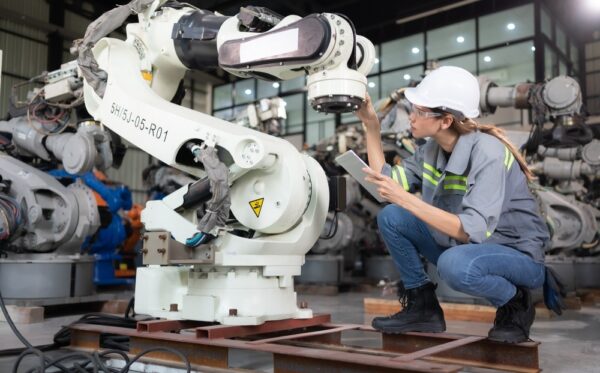
The best industrial automation solutions come after partnering with a custom automated machine designer, builder, or robotics and equipment integrator. There are many integrators out there, and you may find yourself in a situation where multiple automated systems integrators bid against each other on your project. The thing to remember is that when a custom automated machine project can take months or years — and the capital investment can reach six or seven figures — you stake your business on this choice.
The correct integrator will complete a project that increases productivity, efficiency, consistency, quality, revenue safety, employee satisfaction, and employee retention with a swift, practical return on investment (ROI).
The wrong integrator will miss timetables, bloat your project scope, and tie up investment resources you could have used in other growth opportunities for years.
Here’s what to look for in your robotics system integrators to ensure you get all the benefits without the risks.
Seek a Single-Source Guarantee
The ideal automation systems integrator handles every stage of the machine design and build in-house. Their vertically integrated team of software engineers, mechanical engineers, CNC machining experts, and electrical engineers cross-collaborate to minimize issues and maximize quality.
A single-source industrial automation partner relies on no third parties, no outsourced design, and no opportunities for intellectual property leaks. Your machine graduates from stage to stage in a seamless handoff with consistent staff and backups available to answer your questions and address your concerns.
Your automation systems integrator should match your commitment equally with the same investment of time, labor, and resources. They should maintain institutional memory, from the earliest design to the final integration and installation.
A vertically integrated team resolves issues with your project in real time with full mobilization. Single-source centralizes accountability and aligns the complexities of machine design engineering with the machining, assembly, and testing involved in the machine build.
Compare that to managing multiple third-party contracts, managing communication across time zones, and the complications involved with communicating with multiple companies with conflicting obligations.
Related Reading: Never Automate Without a Single-Source Guarantee
Automate Agnostic to Brand

The ideal automation systems integrator signs no exclusive contracts for parts, software, or services. Instead, an agnostic custom automation machine integrator finds the technology to fit your solution — not fit your solution to their sponsorship.
Integrators that have exclusive contracts with companies for things like robot arms, software, or assembly components typically do so to reduce their own costs and advertise that as a saving they pass on to customers. It forces them to ignore better solutions in the name of contractual obligations.
When you’re making a long-term capital investment in your manufacturing, you simply cannot afford to ignore the build options available in the name of saving an integrator money. You may spend years paying for short-term mistakes.
Related Reading: How to apply 80/20 principles to your Automation Integration
Understand ROI and Budget
The right automation partner does more than calculate the ROI figures for your custom automated machine or robotic solution. They can create a scatterplot of comparative project opportunities based on variable risk, return on investment, and comparisons to your current manufacturing line costs.
A mature custom automation integrator prioritizes ROI as the primary justification for a project rather than focusing solely on the available budget. The right integrator takes the time to research your current production shifts, costs, and goals and translates them into multiple high-level machine model options. They then work with you to exploit the new opportunities created by your advanced manufacturing capabilities.
- Underbids: Beware integrators that underbid. It’s tempting to take the lowest bid on your project, but ask yourself how happy you’d be to know you had the cheapest seatbelts, parachutes, or hard hats.
- Knowledge: A responsible integrator bids by taking the time to understand the labor, engineering, and part costs. An irresponsible integrator bids to get the business and later bloats the costs with change orders, delays, and scoping integrity issues.
- Commitment: A responsible integrator uses a combination of research, ROI, and communication to create a practical budget for your machine. They commit to that budget in the scope of work and strictly define the costs associated with late changes to avoid scope bloating.
- Timeline: A responsible automation integrator will define on-schedule and off-schedule work. They’ll acknowledge delays are a dollar-to-day increase in the time and investment needed to reach ROI. They should manage cross-team collaboration with Gantts, meetings, and a support-based work environment.
Related Reading: How You Should (and Shouldn’t) Calculate Your Return on
Investment with Your Integrator
Commitment to Testing Standards and Contracts
A responsible automation systems integrator never compromises on Factory Acceptance Testing Standards, Site Acceptance Testing Standards outlined in the Scope of Work (SOW), or the agreed-upon targets of the final automated machine.
- They don’t skip steps and or compromise quality to skimp money or time.
- They define changes as in scope or out of scope.
- They maintain a professional commitment to design and standards of quality and respect realistic delivery timelines.
- They establish mutual expectations between customers and integrators for responsibilities.
Be wary of integrators who are willing to skip steps and agree to changes on a whim — and always be skeptical of a bid that’s drastically lower than others. Proper testing and consistent design prevent logarithmic increases in cost and timeline if changes need to be made late in the integration phase.
Related Reading: Why Machine, Automation, and Robotics Designs
Change After the Project Proposal
Defined Communication, Defined Ownership

A quality automation systems integrator sets designated communicators between the customer and the integrator. They’ll require informed backups capable of maintaining institutional memory and consistent delivery.
They also maintain project-assigned staff to ensure that when you need to speak with the software engineer, designer, mechanical engineer, or project manager, you’re talking to the same person in their designated role from the beginning to the end of the project.
They’ll also create a framework for regular meetings, ad hoc updates, stages of delivery, and definitions of success and failure. They take ownership of the technical engineering while realizing your high-level concept requests. They take pleasure in educating the customer on everything from general automated engineering to the technical details of the machine.
Be wary of integrators that expect you to make specific parts selections, engineering choices, or technical decisions. The number one cause of scope bloat, delay, and runaway costs comes from poor communication and ambiguous ownership.
Related Reading: Demand Communication: Inoculation Against Late Changes to
Your Industrial Machine Design Proposal
Workforce Engagement Plan
A quality workforce engagement plan is what separates effective custom machine integration from machines gathering dust. A quality automation systems integrator puts boots on the ground, interviews operators and related staff, and creates designs built on the principles of workforce engagement.
The best automation integrators inform the workforce about the improvements to the work environment, new job opportunities, training programs, and displacement or reassignment caused by machine integration. They make the schedule clear and notify the production floor if there is any percentage decrease in production during installation.
Be wary of an integrator that ignores workforce engagement. Your machine could miss simple, practical improvements that require an operator’s perspective to understand. A workforce has tremendous energy and enthusiasm. If minimally engaged, they’ll redirect that energy to resistance if you lose that initiative.
Related Reading: The Top 8 Myths of Automation
Long-Term Relationship
A custom automated system requires years of partnership, communication, and collaboration. Contracts signify a mutual agreement to financial terms, labor, and engineering. You’ll ask each other for changes, updates, and cooperation on a formal and informal basis.
Never sign anything you’re uncomfortable signing, have misgivings about, or disagree with. A quality automation integrator will take the time to work through any concerns or requests before signing any long-term contracts. Our best recommendation is to take your time planning, considering, and approving the terms of the business relationship. A few extra weeks of work in the planning stage can create a more productive partnership and save months or years of frustration.
Related Reading: Businesses Need Long-Term Contract Manufacturing
Discover a Successful Automation Journey
Choosing the right custom automated machine and forming a partnership with a dedicated automation systems integrator isn’t just about simply enhancing your current manufacturing processes; it’s about setting your business up for future success.
Choosing the right industrial automation partner is vital. It determines not only the efficiency and quality of your manufacturing automation integration but also the innovation and competitiveness of your business in the market.
Remember, this decision is about more than just immediate gains. It’s about building a long-term relationship that will drive your business with cutting-edge technology and innovative solutions for years to come.
The right partner understands your vision for manufacturing automation integration and works closely with you to make that vision a reality.
Now you’re equipped with the knowledge to make an informed decision, it’s time to take the first step toward a successful automation partnership. Whether you’re just starting to explore the possibilities of automation or are ready to take your manufacturing to the next level, we’re here to help.
Tell us more about your project, schedule a virtual meeting, or call (262)-622-6104 to set up a free virtual automation discussion with an automation specialist.
Your journey to a more efficient, innovative, and competitive manufacturing operation starts here.
About the Author:
Sean McKittrick, as Project Program Coordinator at DEVELOP LLC, brings a multifaceted background from Knox College. McKittrick’s first year at DEVELOP LLC has been marked by significant team growth and zero turnover, showcasing his ability to build a collaborative and effective work environment. His experience spans quality management in healthcare software to managing production for a million pounds of material monthly, highlighting his diverse expertise in project coordination and manufacturing excellence.
